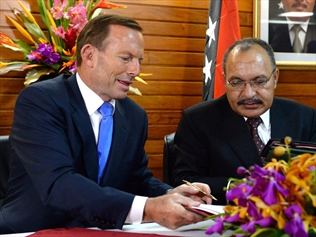
Australian Prime Minister Tony Abbott flies to Papua New Guinea this week for a Pacific Islands Forum that once again faces the danger of preoccupation with its own processes — including whether Australia should remain a member.
The host, Prime Minister Peter O’Neill, told The Australian the Port Moresby summit “will showcase PNG’s energy and diversity, and we shall take leadership roles in some issues we are passionate about”.
These would include “climate change — and how the Pacific should position itself in that debate” in the run-up to the Paris World Climate Summit, “and about economic integration of the Pacific as a means of supporting the development of the region and mobilising skills”.
Abbott’s participation will mark the first attendance by an Australian leader at the peak Pacific body’s summit for three years, since in 2013 it coincided with the federal election and last year with the shooting down of flight MH17.
A core challenge for the meeting will be to avoid being diverted by the noisy absence of Fijian Prime Minister Frank Bainimarama, who is likely to send Foreign Minister Inoke Kubuabola.
Australia and New Zealand led the rapid re-embrace of Fiji within the Pacific Islands Forum following Mr Bainimarama’s election last year under a new constitution he drafted, after its suspension during eight years of military rule.
But the Fiji leader has intensified his demand that Australia and New Zealand quit the body.
While he was military ruler, Bainimarama established a rival grouping, the Pacific Islands Development Forum, which Australia and New Zealand had hoped he might quietly let lapse. Instead, he has stepped up Fiji’s funding of the body, which met — seeking to steal thunder from the PIF, the senior body — in Suva last week.
The heads of eight of the 14 PIF island states attended the PIDF, as did the Deputy Prime Minister of Thailand’s military regime, General Thanasak Patimapragorn, and Commonwealth secretary-general Kamalesh Sharma.
Bainimarama used the platform to attack Australia again, appealing to the country to “abandon the coalition of the selfish” by halting coalmining, and sending “a simple message” to Abbott “to put the survival of your Pacific neighbours before ... your continuing reliance on the dirtiest of energy sources”. “It is only because of the leadership shown by the PIDF that any reform has taken place in the PIF,” he said.
Closing Friday’s meeting, he asked, inciting comparison with the PIF: “Where else, informally and in the relative absence of security, can we still engage with each other in the Pacific way?”
The Bainimarama government has also sought to emphasise the role of the Melanesian Spearhead Group, a sub-organisation within the PIF framework.
Shaheen Ali, Fiji’s Trade Department Secretary, claimed a week ago after a meeting in Nadi with other MSG trade officials, that their planned agreement would be the only one in the region to include services, investment and labour mobility.
Negotiations have been under way for six years towards a PIF-based free-trade deal that includes Australia and New Zealand.
O’Neill, who has devoted considerable attention to the Pacific island states, declined to criticise Bainimarama.
“It is an issue for the Prime Minister of Fiji, whether he attends or not,” he said. “He has already been given his invitation, and we have been told by Fiji officials that the country will participate, but at what level of leadership is entirely up to Fiji.”
PNG has been a strong supporter of Fiji for many years, especially during the difficult years during which PNG tried to build a bridge between the country and the outside world, particularly with this region.
“And some of our efforts have led to the elections, and the return of a democratically elected government, and a restored relationship with some of our neighbouring countries” — indicating Australia and New Zealand.
Fiji was an integral part of the Pacific, he said, “and as soon as they re-engage with the rest of the regional community, participating at all levels, it’s better for everyone.”
O’Neill said the issues challenging the region were “not a matter of who is leader”.
“We are a large country, with the largest economy in the region, and we have an obligation to ensure the region also benefits from growth and development taking place here,” he said.
Meg Taylor, the new secretary-general of the Suva-based Pacific Islands Forum, a lawyer and diplomat from PNG who worked in Washington as compliance ombudsman for the World Bank’s International Finance Corporation, highlighted other issues on the agenda for the summit. She said that “maximising revenue from our fisheries is, of course, a potential game-changer”.
And “a response to alleged human rights issues within West Papua will also be put to leaders for consideration”
